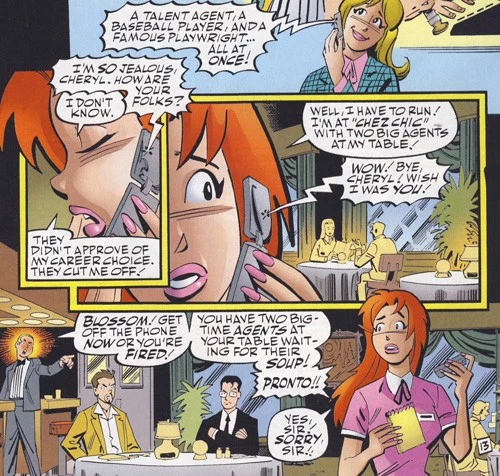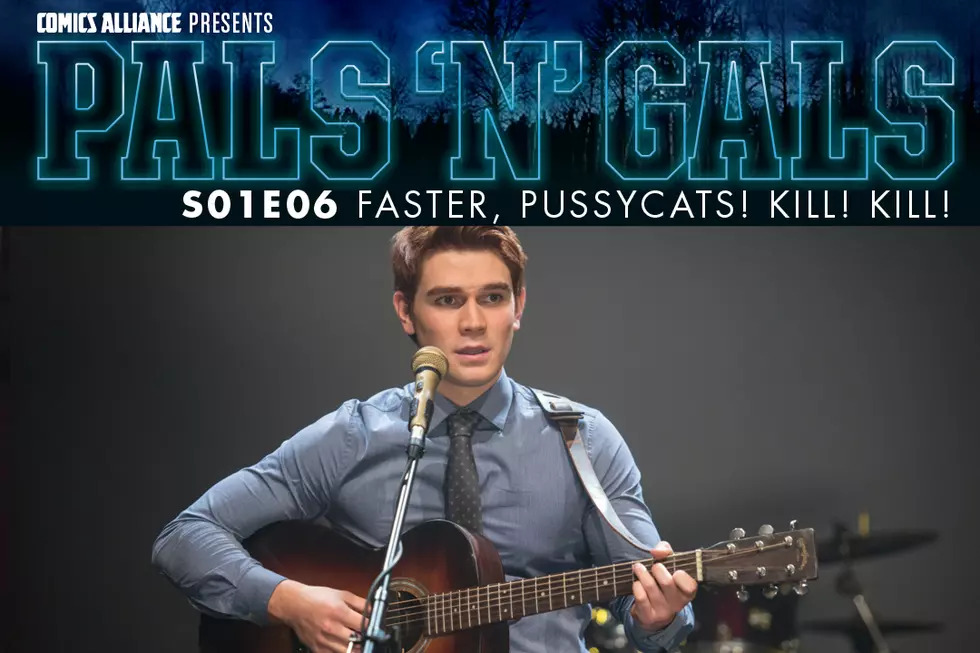
‘Life With Archie: The Married Life’ #1 Is the Most Fascinating Archie Comic of All Time

This week, Archie Comics releases the first issue of "Life With Archie: The Married Life," a new magazine-sized series that follows up on last year's popular story arcs depicting a pair of alternate futures in which Riverdale's favorite son got married to Betty in one and Veronica in the other.
As much as I love the Archie books -- and believe it or not, I actually have a ton of completely unironic affection for those characters and the stories -- I actually wasn't much of a fan of the wedding storyline. Part of it comes from the fact that I'm way more fannish and nitpicky about Archie than I probably should be and I tend to dismiss stories that I consider to violate the premise of the characters as teenagers (I don't even like "Little Archie"), but beyond that, it just seemed to fall flat. The characters seemed more one-dimensional than normal, and even the art -- by longtime Archie artist Stan Goldberg -- seemed rushed. In other words, it seemed like a stunt.
This, however, is something completely different. And it's the most fascinating Archie comic ever printed.The first thing to notice about it is that, as you can see from the cover above, it's been designed to look less like a comic and more like a magazine -- specifically a teen/"tween" mag, given that it boasts pictures of Justin Bieber and the werewolf from "Twilight." It's pretty clear that from a design standpoint, Archie's going after the young market, and the non-comic portions of the magazine seem to bear that out.
The two stories, one set in the future where Archie marries Veronica and one set in the future where her marries Betty (which I promise is going to get way more complicated by the time I'm done) are separated by a section that's essentially fantasy casting for an imaginary Archie movie that encourages readers to go online and vote. It focuses on young actors and actresses that all sort of have the look of the Disney Channel about them, and in what is quite possibly the oldest I have ever felt in my life, I have no idea who some of them are. And I have seen every frame of the "High School Musical" trilogy.
I will say, though, some of the choices I do recognize are pretty much perfect:

My point is, this is a book that's clearly skewing for a younger demographic in terms of design and features. The stories, however, seem to be doing just the opposite.
I think it's interesting that the creators decided to go with the title "Life With Archie," because it's actually a revival of a comic that, in the mid to late '70s, was less about the typical Archie story where he makes two dates at once and more about Betty and Veronica getting trapped in a burning building in a story called "HOLOCAUST."

I love these comics, mostly because they seem so utterly insane when you see them next to the core Archie titles -- drawn in the exact same style-- where Betty and Veronica's biggest problem is that they both wore the same dress to the Spring Formal, rather than being burned alive while Archie watches in horror. And yet, it seems like it's exactly that kind of storytelling that Uslan is continuing in his "Life With Archie."
I've joked before that a comic that was really about "Mature Themes" wouldn't have swearing and sex and violence and other stuff teenagers like, it'd be about a guy who was really dissatisfied with his job and worried that he'd made the wrong choices and become a failure in his life while slowly growing more isolated from the people he once called friends. And that is exactly what this comic is about.
In part, that manifests itself as a litany of tragedy so relentless that it's almost Funky Winkerbeanian in scale. In the future where he marries Veronica (Earth-V), Archie is in a job he doesn't like, Betty's unemployed and has moved back in with her parents after a string of relationships that she claims have led to her "failing at everything," Moose and Midge have broken up due to his anger issues, and Cheryl Blossom's been disowned by her rich parents after quitting school and moving to Los Angeles to become an actress, only to end up as a waitress who lies to her friends to cover her failure:

Over on Earth-Betty, Archie's a struggling musician in New York who can't get a break, Betty's recently taken a pay cut due to the recession, and Miss Grundy is dying of a terminal disease.

In both storylines, Mr. Lodge has become the ruthless plutocrat that was always hinted at: On Earth-Veronica, he's attempting to buy up the entirety of Riverdale and forces Archie to buy Pop Tate out for a low sum after driving the Chocklit Shoppe to the brink of bankruptcy, and on Earth-Betty, he attempts to literally pay Archie to divorce Betty and come back to Riverdale because Veronica has become too depressed to work.
Even considering that the structure of every comedy is to make things bad before they eventually get good again, It is mercilessly depressing.
But I think there's more to it than just twisting the emotional knife on these characters. There's been a long-running subtext to the Archie books for decades that since Betty and Veronica are essentially physically interchangeable (aside from hair color), the real choice between them was one of social class and the value of love. Veronica represents high status and affluence but a lack of real love -- she only sees Archie as a trophy to be won -- while Betty represents true love and a life of poverty.
Michael Uslan and artist Norm Breyfogle --both of whom are probably more well-known to super-hero readers for their work on Batman -- are not only taking these ideas to their logical conclusion, they've recast them as a character struggling with the problem of modern society. This is an Archie that as a grown-up -- or at least as much of a grown-up as you can be while getting paid to write about comic books -- I can identify with. He's living the choice between a well-paying but morally ambiguous job that is literally destroying his friendships, and forsaking the corporate world in favor of creative pursuits that run the risk of leaving him destitute. It's the problem of my generation, that no matter what we do, we stay up at night wondering if we made the right choices and hoping we didn't screw it all up, all the time wondering why everyone else seems to have it all together.
Nothing embodies this more than the fact that this is a magazine with Justin Bieber on the cover that has this image as a pull-out poster in the centerfold:

That's the "cover" to the Earth-Veronica story: Archie with fists full of cash realizing that it doesn't make him happy, while Veronica wonders if she trapped him into a life he hates. I cannot imagine that being tacked up on a kid's wall next to Selena Gomez and Robert Pattinson, because I don't know any twelve year-olds who could identify with that.
But my friend Euge, who is my age and who just quit his job as a lawyer to become a rapper? He knows exactly how Archie feels.
It's absolutely brilliant, because It's not only the best possible use of that premise, but it also shows exactly why that premise is flawed. Archie is meant to be a typical teenager, with problems that are therefore relatable and presumably funny. We can all laugh at a story where Archie can't decide who to go to the prom with because in the long run, it doesn't really matter. But if you age him, if you make him the typical aimless twentysomething, his relatable problems suddenly aren't that funny. "Oh no, Archie's got detention again and can't go to the movies!" has a comedic ring to it that "Oh no, Archie lost his job again and can't pay his rent!" just lacks.
It's absolutely fascinating. And that's before the stuff about parallel universes shows up.
Yes, really.
It's actually seeded during the Earth-Veronica story when, during a "mini-reunion," they mention that Dilton -- the nerdy amateur scientist of the Archieverse -- is absent, but it doesn't come up again in that story. In the Earth-Betty story, however, there's this:

It's actually pretty easy to miss; it's at the bottom of the page and even if you spot it, "Dilton is a crackpot scientist who is missing and presumed dead" doesn't stick out all that much when it's next to "Miss Grundy has cancer" and "Veronica is crippled by depression." But then this happens:

Seemingly out of nowhere, there's suddenly a full-page shot of all of the different versions of Archie, and then the story continues as though nothing had happened. For people who are into Archie, this is on the level of "Crisis on Infinite Earths." Dilton -- and a second version of Dilton -- driving through Archie's alternate realities, including the two that this magazine is based on.
Keep in mind that the "Married Life" stories are based on a weird little device that was introduced a couple years ago called "Memory Lane," an actual street that Archie or Jughead would walk down and end up meeting their counterparts from the original 1940s stores. In Uslan's story, Archie instead walked up Memory Ln. until it reached both a literal and metaphorical fork, with each side leading to a marriage with one of his two girlfriends.
Here, Uslan is actually codifying that as the formation of an Archie Multiverse, and looping other stories into it. And it gets even stranger when Dilton shows up with a crude diagram, mapping out the changes that have happened to his friends since High School:

In effect, Dilton has become the constant between the two stories, missing from one but secretly active in the other, the centerpiece about which the entire "mystery" (which I don't even recall being a selling point of the book before I read it) revolves. He can see the possibilities, the consequences, and the problems. He's wondering where it all went wrong and trying to change it back. In effect, Dilton is us.
And seriously? "Love or hate... life or death... Betty or Veronica" is quite possibly the single greatest line in comic book history.
More From ComicsAlliance


![Take A Trip To The Relatively Murder-Free Classic Riverdale In ‘Best Of Archie 2016′ [Preview]](http://townsquare.media/site/622/files/2017/03/BestOfArchie01.jpg?w=980&q=75)
![The Blossom Twins And Pete Woods Wreak Havoc On Riverdale In ‘Archie’ #18 [Interview]](http://townsquare.media/site/622/files/2017/03/Archie00.jpg?w=980&q=75)




![The Many Loves Of Archie Andrews: A Guide To America’s Favorite Teen’s Love Life [Love & Sex Week]](http://townsquare.media/site/622/files/2017/02/Archie-Featured.png?w=980&q=75)
